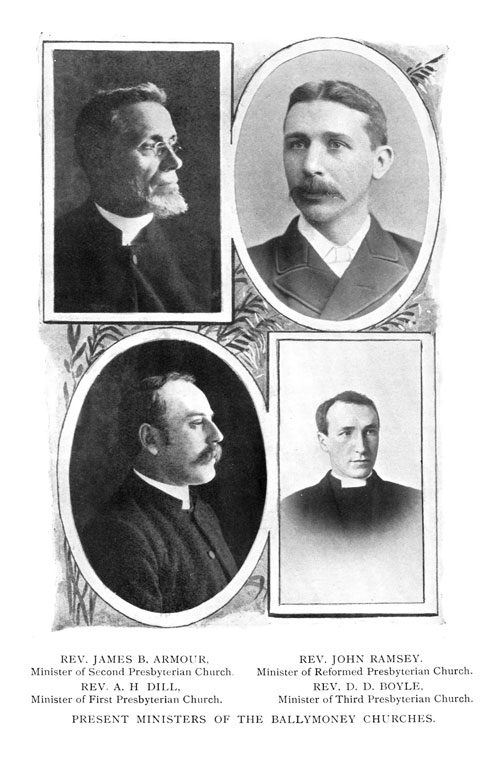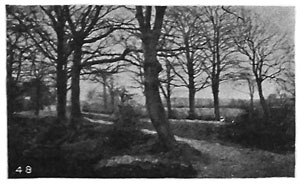Chapter V.
HISTORY OF THE THIRD PRESBYTERIAN CHURCH.
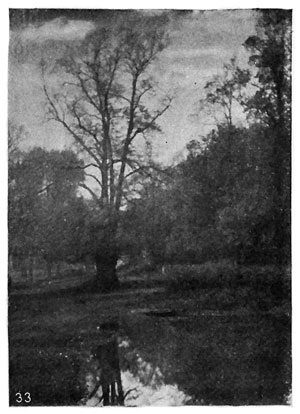 IT might be well to explain that prior to the union of the General Synod of Ulster with the Secession Synod, this Congregation was known as the Second Presbyterian Church of Ballymoney, in connexion with the General Synod of Ulster. The following extract from the old minute book of the Committee in charge of the congregation gives us a brief account of its origin.
IT might be well to explain that prior to the union of the General Synod of Ulster with the Secession Synod, this Congregation was known as the Second Presbyterian Church of Ballymoney, in connexion with the General Synod of Ulster. The following extract from the old minute book of the Committee in charge of the congregation gives us a brief account of its origin.
"1834, Balnaraore, 3rd May.
At a meeting of the Committee of the new Presbyterian Congregation of Ballymoney under the care of the Reverend the Presbytery of Ballymena held at the house of James McMaster, Mr. Archibald Holmes in the chair.
"It was unanimously resolved that a memorial be sent forward to the Reverend the Presbytery of Ballymena to meet at Portglenone, on Tuesday, the 13th inst., praying for constant supplies of young men. Resolved that Messrs. John Picken and John Hart be requested to present our memorial to the Presbytery."
On the 10th May, 1834, at Ballymoney, the Committee met in the Court House, when the following Memorial to the Presbytery was unanimously agreed upon.
"To the Reverend the Presbytery of Ballymena to meet at Portglenone on the second Tuesday in May.
"Reverend Sirs,
We the Congregational Committee of the new Presbyterian Congregation in the town of Ballymoney, beg on behalf of ourselves and the understated Presbyterians of this parish, to return our sincere thanks to your Reverend" Body for the kindness shown to us in granting occasional preaching in the town of Ballymoney free of expenses, thereby enabling us to form ourselves into a congregation statedly to worship there with every prospect under the Divine blessing of success.
"In times past we have had great reason to lament the want of sufficient accommodation for the purpose of public worship and that whilst other religious denominations were growing around us it appeared as if the Presbyterians in connection with the General Synod of Ulster were alone destined to remain stationary notwithstanding the great increase of our population which is more than doubled since the erection of our meeting-house in the year 1777, and that whilst the Presbyterian population of our parish consists of nearly one thousand families, the seatholders are less than four hundred, and to these privations may be attributed, in a great degree, the want of that religious zeal which should have prompted us sooner to have made our wants known to your Reverend Body and the excuse we have no seat was to very many deemed sufficient to keep them at a distance from the Church of the Saviour.
"Now, however, we have great reason to rejoice and to bless God that his Spirit seems to influence many who have heretofore been satisfied with the name of Presbyterian only, to come forward and say we desire to have a place where we may have an opportunity in public of worshipping the God of our fathers. Our committee of management for the erection of a house have decided that it shall be built in the town of Ballymoney, and the prospect of liberal support in aid of the erection in that place exceeds their most sanguine expectation.
"We have already connected with us one hundred and thirty-seven families who have come voluntarily forward to join us, and we have subscribed a sufficient sum to enable us to pay for regular supplies. We pray your Reverend Body to grant us preaching on every Lord's day for which we will pay, and we beg to suggest that as there are still a few of the ministers connected with your Reverend Body who have not had an opportunity of preaching to us agreeable to your former arrangements, that it might be well in the event of your granting us regular supplies of young men, to arrange that one of them would preach in every month that we may have ministerial duties performed amongst us until it pleases God to grant us a stated pastor.
"We would beg also to inform you that as half-past eleven o'clock precisely is the hour religious worship commences in the other houses in town that the preacher who is to supply us would require to be in town at eleven, so that our congregation might be enabled to commence at the same time -- this is of the utmost importance to new erections."
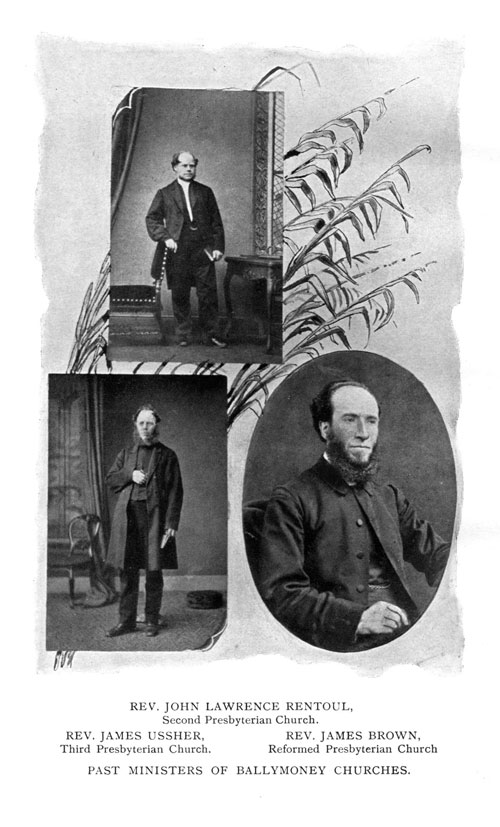
Signed by all the members present. Among the names are James McMaster, John Hart, John White, John Forbes, James Picken, Hugh McClean, and William John Orr. At the General Synod in Derry, 1834, the Ballymena Presbytery reported, "they have erected a new congregation in connection with this church at the request of a number of families in the town and neighbourhood of Ballymoney who had not accommodation in your place of worship; that the sum of £300 has been subscribed towards the building of a house and a pledge given by them for the payment of at least £60 annual stipend for the support of a minister."
Steps were immediately taken to procure a hearing of suitable candidates for the new charge, and in those days "preaching on trial" was indeed an ordeal, as it extended over four successive Sabbaths. After the hearing of two candidates, Mr. Ussher was chosen as minister. A minute under date March the 9th, 1835, Ballymoney, runs thus:--
"This day in the Market House of Ballymoney a poll was taken by the members of the second Presbyterian Congregation, Ballymoney, on behalf of the Reverend James Ussher. The Reverend R Park, Chairman; members present, the Revs. Kennedy and Bellis; when the aforesaid James Ussher was without a dissenting voice chosen to be the minister of the aforesaid Second Presbyterian Congregation, Ballymoney, and that if the aforesaid James Ussher accepted of the call which was then made out he was to receive sixty pounds a year, but in case that the aforesaid James Ussher would by his attention to his ministerial duty both before and after the church of the Second Presbyterian Congregation, Ballymoney, was ready for the worship of Almighty God, add any more to this sum, viz.: Should the stipend of the aforesaid congregation exceed sixty pounds yearly he, the Reverend James Ussher, was to receive the same."
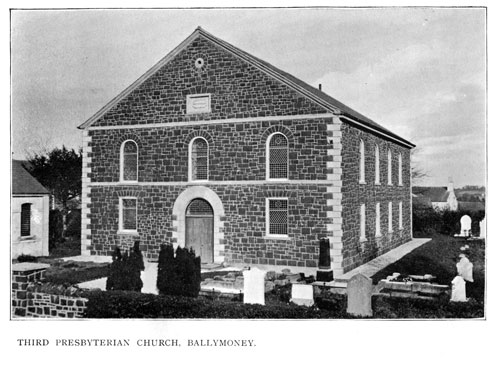
Mr. Ussher accepted the call and was ordained on the 11th June, 1835, in the First Presbyterian Church, Ballymoney; the Reverend Samuel Lyle preached the sermon, the Reverend R Park defended Presbyterian Polity and the Reverend G. Hamill gave the charge. Immediately after, a suitable place of worship was erected, and on the 20th March, 1836, the present meeting house was opened for public worship by the Reverend Dr. Cooke, of Belfast. So far as can be gathered the approximate sum expended on the building was £1160. The sacrament of the Lord's Supper was dispensed for the first time on the 19th June, the Reverend William Wallace, of Rasharkin, assisting Mr. Ussher.
There was no stated Session until the 11th October, 1848, when the following persons were regularly ordained as elders, viz.:-- Samuel Boyd, William Glenn, James Hamill, John Anderson, R M. Stevenson, William John Orr, and Matthew Gilmore.
Under the able ministry of Mr. Ussher, and the efficient help afforded him in his pastoral duties by his elders and office bearers, the church grew and prospered until in the month of December, 1857, it was found necessary to take steps towards the erection of a gallery in order to afford suitable seating accommodation for the worshippers. Accordingly a gallery was erected in the year 1858 at a cost of £215.
The accommodation thus afforded came in due season, as the year which followed brought that wonderful event -- the revival of '59 -- as it is generally known; and as a consequence the church was filled to overflowing. The following account of a revival soiree, held in the Third Presbyterian Church, on Tuesday the 10th April, 1859, will doubtless prove interesting reading to all and serve to recall an interesting incident in the lives of not a few in the surrounding districts.
It is reported in the Coleraine "Chronicle" of that date as follows: "The Church which is seated for seven hundred persons was completely filled by an assembly composed of members and friends of all the churches in the town and neighbourhood. The greater number of the persons present had experienced a revival."
"The blessing was invoked by the Rev. Mr. Rentoul, and after tea had been partaken of, thanks were returned by the Rev. Mr. Anderson of Second Kilraughts."
"Mr. Ussher then ascended the pulpit and after expressing pleasure at seeing so many present read the one hundred and thirtieth psalm, a portion of which was sung. The meeting was opened with a very solemn prayer offered up by the Rev. R Park."
"Mr. Ussher then introduced to the meeting the Rev. S. M. Dill, Ballymena, who in a speech of great eloquence and power, gave a most interesting statement of his late visit to the United States, as one of a deputation from the Presbyterian Church in Ireland. He spoke of the influence of the Puritan principles carried to the country by the Pilgrim Fathers in the "Mayflower," and of the state and prospects of the Presbyterian Churches in that great land, and to the happy effects of the great revival wherewith the church there has been visited during the last two years."
"The Rev. Alexander Field, Dervock, followed in a most interesting address on the Ulster Revival of the past season. He connected it with the revival of the 17th century, showed its necessity and the purity which it had already produced, and concluded an eloquent address by urging upon all a holy life as the evidence of a changed heart, and the necessity of earnest prayer for a more abundant outpouring of the Holy Spirit during the coming season.''
"The Rev. Jonathan Simpson, Portrush, then addressed the meeting in a most earnest manner, detailing some of the revival scenes which he had witnessed during his late visit to Scotland. His address was a very happy one. The audience was deeply affected, the great majority of them even to tears; several parties cried aloud for mercy, and were as soon as possible removed."
"Instead of proceeding to hear other addresses, it was suggested that the meeting should unite together in praise, and that prayer be offered for the many anxious souls that appeared to be present. The 80th Psalm, 11th verse, was sung with deep feeling, and the Rev. Mr. Martin offered an earnest and appropriate prayer for all those who were present."
"The soiree was conducted in the most exemplary manner. The ministers spoke from the pulpit, and the audience sat as quiet as under the ministry of the Gospel on the Sabbath. The meeting was altogether a solemn one and refreshing to the souls of many. The proceedings were closed at a quarter past eleven o'clock by the Rev. Mr. Rentoul, and many regretted that they were not continued longer. Several of the ministers remained to engage in prayer with some of the parties who had been affected during the night."
The in-gathering of souls in this, and succeeding years, led to increased pastoral oversight, and steps were taken to meet this need; so in October, 1886, the following were ordained to the eldership; -- John Morton, Quintin Stevenson, R Gilmore, James Craig, R White and William Taggart.
Ably assisted by these men, Mr. Ussher carried on his good work in the midst of the people for the long period of forty years.
After these years of faithful service, Mr. Ussher, through declining health, asked leave to resign, which was granted. After a few months of well-earned rest from the active labours of the ministry, he died at Portrush on the 23rd December, 1874.
The following is the inscription on the beautiful mural monument in the vestibule of the Third Presbyterian Church: --
|
ERECTED |
"He was the first minister of the congregation and his faithful and successful pastorate extended over a period of almost forty years."
"Blessed are the dead which die in the Lord from henceforth, yea saith the Spirit, that they may rest from their labours, and their works do follow them." -- (Rev. xiv., 13).
On the resignation of Mr. Ussher the congregation immediately proceeded to hear candidates with the view of having an assistant and successor appointed. Their choice fell on Mr. Thomas A. Thompson, a licentiate of the Derry Presbytery, and he, accepting their invitation, was ordained on the 24th November, 1874.
Under his ministry and pastoral oversight the congregation entered on a new era of prosperity, as can be gathered from the following facts.
In the year after his ordination he proceeded to have a manse erected at the cost of £700. Encouraged by the success which attended this effort and by the increasing numbers of the congregation, the office-bearers heartily approved of the idea brought before them of having the church completely renovated. With this in view Mr. Thompson meantime went to America to collect the necessary funds. His efforts were most successful, and after three months' absence he returned with the sum of £500. This, together with the congregational subscriptions and the collections taken up at the opening services, enabled them to open the church free from debt after being completely renovated at the cost of £850. Finding that there were still some funds on hand they decided to erect a lecture hall which was greatly needed for the carrying on of the work of the Sabbath school and other congregational meetings. This they also completed free of debt at the cost of £300 in the year 1889. At this time the following were added to the session: John Taylor, Isaac Boyce, James Thompson, Thomas Heaney, John Milford, R John Stevenson, W. J. Michael, Alexander Henning and John McDowell. Four of these are now dead, the others are still engaged as active members of the session in the pastoral oversight of the congregation.
Like most other congregations in the later years of its life this church has suffered considerably from both emigration and migration yet it still continues to be both healthy and vigorous. The present minister, Rev. D. D. Boyle, a licentiate of the Limavady Presbytery, was ordained on the 28th January, 1896.
